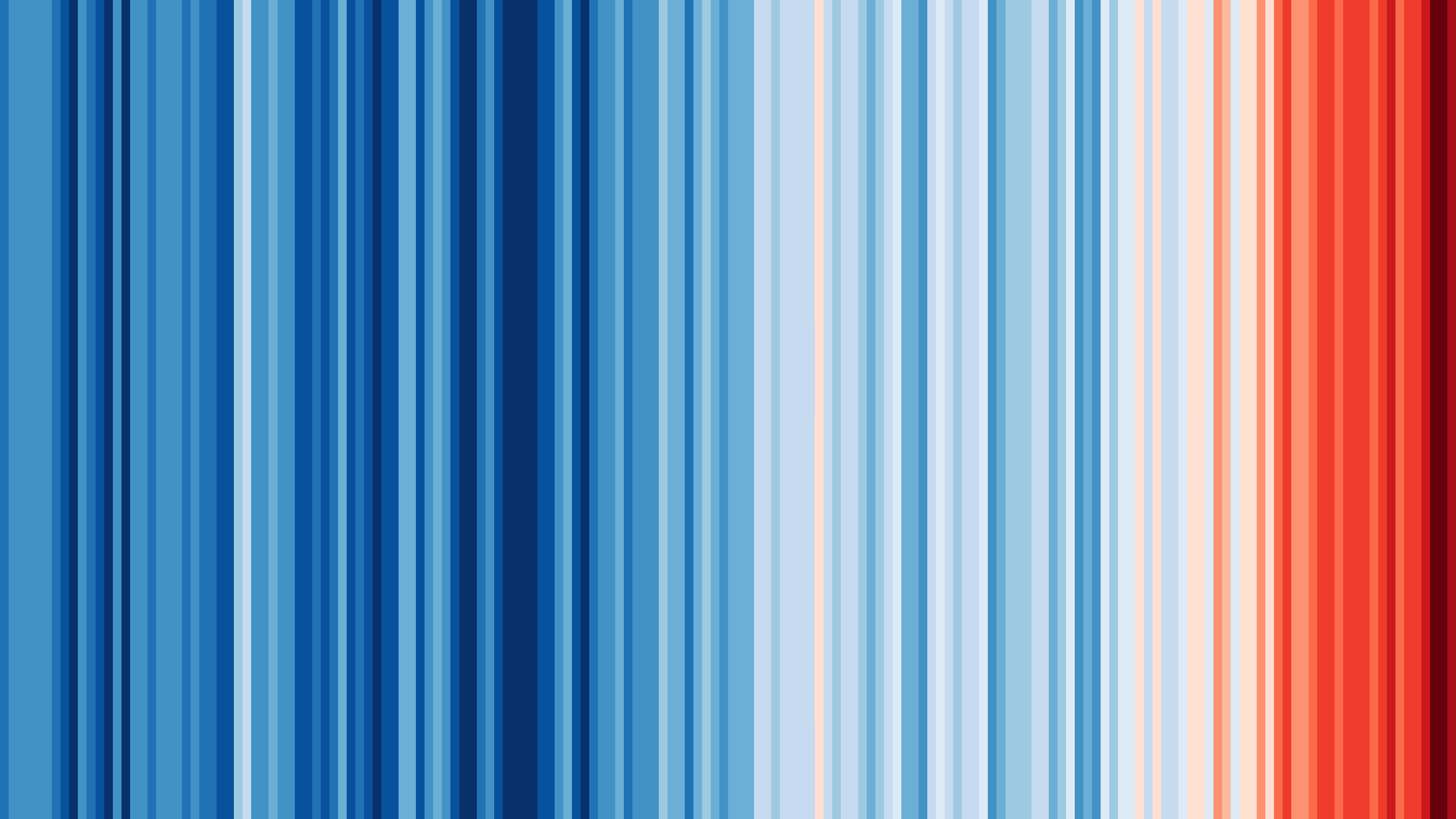
Melissa Joskow / Media Matters
If you happened to watch your local weather forecast last week, you might have noticed a striking pattern being featured. On June 21, the first day of summer, meteorologists across the country and around the world took part in the #MetsUnite campaign to raise awareness of climate change by featuring a distinctive “warming stripes” pattern in their broadcasts.
On air and on social media, meteorologists donned ties and necklaces and showed off coffee mugs featuring the red, white, and blue stripes. The pattern, created by climate scientist Ed Hawkins, uses a color scale to illustrate rising global temperatures driven by climate change from 1850 to 2017. From left to right, each stripe represents a year with blue stripes indicating cooler average temperatures and red stripes indicating warmer ones, making for a clear visual representation of our recent record warming.
The #MetsUnite campaign was started by meteorologist Jeff Berardelli of CBS affiliate WPEC in West Palm Beach, FL, who was inspired after seeing Hawkins’ image. “It struck me as an opportunity to communicate climate change in the simplest way possible,” Berardelli told The Washington Post’s Capital Weather Gang. “In the past few years, it seems the impacts of climate change have accelerated. … And most climate scientists agree we have literally no time to spare to turn the ship around. When we look back, we will view 2015 to 2017 as the turning point years; the years when climate change ‘got real.’”
Berardelli discussed the campaign during his broadcast on June 21 and connected global warming to West Palm Beach, saying, “Here locally, our temperatures have been shooting upwards. In fact, days above normal, back in 1970 we were at about 30; now our days above normal are over 60, so more than double.”
Altogether, more than 100 meteorologists around the world took part in the campaign, with many of them making impassioned calls for accepting and addressing the reality of global warming.
Here are a sample of the world wide mets who took part in the #MetsUnite with text for each country/state or city. @ClimateCentral @BernadetteWoods @ClimateSignals @capitalweather @DrShepherd2013 @JohnMoralesNBC6 @WeatherNation @KerrinJeromin @DSatterfieldfax @LoleskyWX pic.twitter.com/G3W3OKoOF4
— Jeff Berardelli (@WeatherProf) June 22, 2018
On Minnesota CBS affiliate WCCO, meteorologist Mike Augustyniak emphasized humans’ centrality to global warming, stating, “[Today is] a day where meteorologists across the U.S. are uniting as real scientists to say that climate change is real, it’s happening now, it’s us, we’re causing it, and if we act now, we can actually do something to reverse this.”
One of the strongest segments came from another South Florida station, which is not surprising given that rising sea levels in the region have driven home the reality of climate change for residents and politicians. On NBC affiliate WTVJ, meteorologist John Morales interviewed Rep. Carlos Curbelo (R-FL) about the need for Republicans to embrace the science behind climate change and take action to address it. Morales then concluded the segment by stating, “We will continue to enhance the message that we need to act on climate. Climate change is real, it’s us, and it’s serious.”
And on NBC affiliate KRNV in Reno, NV, meteorologist Cassie Wilson talked about how the city has been experiencing an increasing number of hotter-than-normal days in recent years, and can expect still more thanks to “the buildup of greenhouse gases in our atmosphere”:
Even as a large number of meteorologists are making strong statements on climate change, members of Congress are attempting to stymie a program that helps meteorologists communicate about climate science during their broadcasts. On the same day that the #MetsUnite campaign took place, four GOP senators attacked the Climate Matters program, which has received some funding from the National Science Foundation. The senators, including Ted Cruz (R-TX) and James Inhofe (R-OK), sent a letter to the National Science Foundation’s inspector general calling for an investigation into the agency's grant-making process.
TV meteorologists are well-positioned to help Americans understand how climate change affects their local communities, climate communications experts say, and the Climate Matters program, which was launched in 2012, is helping them do so. In 2010, only about half of broadcast meteorologists in the U.S. accepted that climate change is happening, according to polling by George Mason University. By 2017, the percentage had risen to 95. And there was a 15-fold increase in TV weather forecasters' segments discussing climate change between 2012 and 2017. In 2018, thanks in part to the #MetsUnite campaign, we're likely to see the number of climate segments keep increasing.
